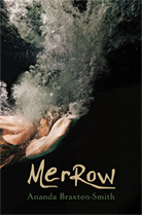Merrow by Ananda Braxton-Smith

Black Dog Books, 2010. ISBN 9781742031361.
Sitting on the bottom of the sea, surrounded by the kelp forests, past
the shelf of the beach near where she lives, Neen sees another face
amongst the swaying tendrils of seaweed. She is not alarmed, for this
is the place she feels most at peace, her refuge from the unanswered
questions of the world above, a world where she is an orphan. Her
father died at sea when she was a babe and her mother disappeared 12
months later, some say, returning to the sea from whence she came.
The opening sequences draw the reader in, the switch and sway of the
seaweed almost mesmerizing as the reader ponders the girl's situation
in life. Her unsympathetic aunt draws our censure as Neen tries hard to
be of use to this bitter woman, but is sent off to do the most
difficult of tasks to keep them alive. Her one friend is the blind
musician, Scully, who appears to know more than he lets on, seemingly
giving Neen information through stories about the past. But it is her
aunt's story that shakes her to her foundations, told when a stranger
is rescued from the sea, half drowned and talking of a mermaid saving
him.
The stories ebb and flow like the tide, giving explanations for what
has happened in the past, giving authority to people's lives, but it is
when Neen finds her mother's bones deep in a cave beneath the tide line
that she wonders about the stories she has been told, and where her
story may lie. This gentle story of Neen's coming of age will have
readers following the story with delight as they ponder the truth. For
Neen the truth is the story she eventually tells of her mother's life,
one that she can retell easily: a story separate from those she has
been told. The stories that make up people's lives are slippery and
changeable, just as is Neen's mother's story and Braxton-Smith has
eloquently shown how stories can alter according to circumstances.
Lower secondary girls in particular will adore this imaginative tale
and think long about the stories of their own lives.
Fran Knight